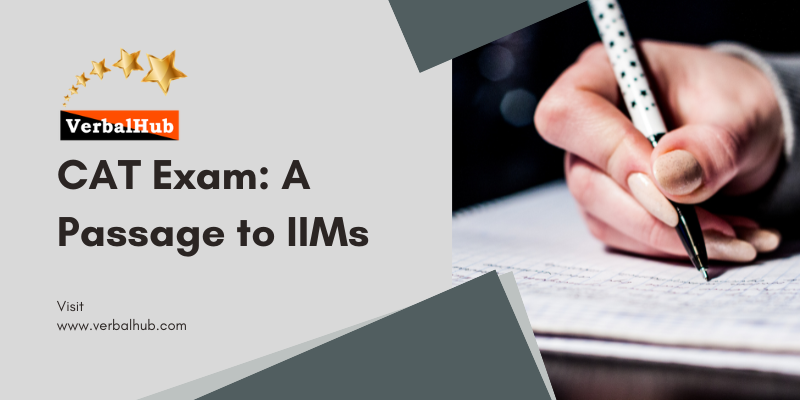
Two curious questions - what is the full form of cat and what is CAT exam for MBA – are commonly urged to surf. The CAT exam, or CAT long form that is the Common Admission Test, is a crucial entrance exam for MBA aspirants in India.
Now, what is CAT exam for MBA? It’s a standardized test designed to assess a candidate's proficiency in areas such as English, Maths, and Reasoning. About CAT exam for MBA, it serves as a gateway to mainly IIMs and other top B Schools. Advantages of CAT exam include access to top-tier MBA programs and enhanced career prospects. The CAT paper is specially structured to challenge and evaluate the analytical and problem-solving skills essential for management studies. Bullet ideas about the CAT exam:
CAT Exam Structure
| VARC: |
Tests comprehension, grammar, and verbal reasoning. (VARC is verbal ability and reading comprehension) |
| DILR: |
Tests the ability to interpret data and think logically. (DILR is data interpretation and logical reasoning) |
| QA: |
Tests mathematical skills and understanding of arithmetic, algebra, geometry, and more. (QA is quantitative aptitude) |
| Duration: |
Total 2 hours (120 minutes), individually 40 minutes. |
CAT Exam Format:
| The CAT is a computer-based test (CBT). |
| The exam typically has 100 questions divided among the three sections, with a total duration of 180 minutes (3 hours). |
| Each section is timed separately, with 60 minutes allotted per section. |
CAT Question Types:
| Multiple Choice Questions (MCQs) |
| Non-MCQs or TITA questions (TITA is Type In The Answer) |
CAT Exam Scoring:
| For the right option +3 marks |
| For the wrong option -1 mark (only for MCQs) |
| No negative marking for Non-MCQs |
CAT Exam Eligibility
| Qualification: |
Bachelor's degree with minimum 50% marks and 45% for SC, ST, and PwD categories. |
| Final Year Students: |
They are eligible to apply. |
CAT Exam Purpose and Acceptance
| The answer to the CAT exam is for what purpose is that it is primarily for MBA from IIMs. Many other top business schools in India also accept CAT scores for their MBA or equivalent programs. |
Importance
| Now, why cat exam is important? There are two benefits: competitive edge and holistic assessment. |
| Competitive Edge: |
Scoring well on the CAT can significantly improve a candidate's chances of getting into top-tier business schools. |
| Holistic Assessment: |
The CAT aims to evaluate a diverse set of competencies essential for excelling in both management education and professional careers. |
Registration and Fees
| Application Process: |
Online registration through the official CAT website. |
| Fees: |
for General/EWS/OBC-NCL: INR 2,400 and for SC/ST/PwD: INR 1,200 |
Important Dates (Example from 2024, subject to change for each year)
| Registration Starts: |
August |
| Registration Ends: |
September |
| Admit Card Release: |
October |
| Exam Date: |
November |
| Results Declaration: |
January |
Top Colleges Accepting CAT Scores
| Indian Institutes of Management (IIMs) |
| Indian Institute of Technology Departments of Management (IITs) |
| Faculty of Management Studies (FMS), Delhi |
| Indian Institute of Foreign Trade (IIFT), Delhi |
| Management Development Institute (MDI), Gurgaon |
| SP Jain Institute of Management and Research (SPJIMR), Mumbai |
Official Website
| For more details, the official CAT website provides comprehensive information on registration, eligibility, and preparation: IIM CAT Official Website. |
Preparation
| Study Material: |
Numerous coaching centers and online platforms offer extensive study resources and practice exams. |
| Self-study: |
A significant number of candidates opt for self-study, utilizing books, online materials, and practice exams to prepare. |
Resources for Preparation
| Official CAT Website: |
Provides information on the exam pattern, syllabus, mock tests, and previous year question papers. |
| Coaching Institutes: |
Many candidates opt for coaching classes for structured preparation. |
| Online Platforms: |
Websites and apps like Unacademy, Byju's, and others offer preparation courses and materials. |
CAT Exam Benefits Why CAT exam is important
The CAT exam for MBA, CAT exam meaning is Common Admission Test, is an entrance examination in India for MBA admission. The CAT exam is used to gain admission to top business schools, including the prestigious IIMs. The CAT exam used for securing seats in various management programs in India. The advantages of the CAT exam include a standardized assessment for B-school admissions and increased opportunities for lucrative jobs post-MBA. Understanding what the CAT exam is for, and its benefits, can significantly enhance one's career prospects in management. Some benefits of the CAT exam are:
| 1. A Passage to IIMs: |
CAT is one the first primary exams that gives the visa to IIMs, which are leading schools for MBA in India. Along with IIM, other best B Schools affirm the score of CAT exam for MBA. |
| 2. Benchmark of Aptitude: |
The CAT exam evaluates aptitude in the sections of English, Math, and Reasoning. A good CAT score is often seen as a benchmark of a candidate's analytical and problem-solving skills. |
| 3. Career Advancement: |
An MBA from a top B School gives them good exposure to their career. Graduates from IIMs and other prestigious B-schools often secure high-paying jobs and leadership roles in reputed companies. |
| 4. Holistic Assessment: |
The CAT exam is designed to evaluate not just academic knowledge but also time management, decision-making, and critical thinking abilities. Such attitudes are crucial for success in management roles. |
| 5. National Recognition: |
CAT scores are recognized and accepted by numerous B-schools across India, making it one of the most important exams for management aspirants. |
| 6. Networking Opportunities: |
Studying at top B-schools provides valuable networking opportunities with peers, alumni, and industry leaders, which can be crucial for career growth and development. |
| 7. Diverse Career Paths: |
An MBA opens doors to various career paths, including finance, marketing, consulting, operations, and entrepreneurship. CAT serves as the first step towards achieving these diverse career goals. |
After CAT Exam: Jobs and Career Opportunities
Again two questions – after CAT exam jobs and CAT exam is for which job – need to be addressed. The CAT exam for MBA is an integral move for aspiring business professionals. One of the primary advantages of the CAT exam is its role in opening doors to prestigious MBA programs, which in turn, lead to lucrative career opportunities. The CAT exam benefits include not only the potential for high-paying jobs but also the development of reasoning skills. The CAT exam uses extend beyond admission, as the preparation helps candidates excel in various managerial roles. After the CAT exam, jobs in sectors such as finance, marketing, consulting, and operations become accessible, making it an essential milestone for those aiming for top positions in the business world. Thus, answers to CAT exam is for what purpose are: :
| 1. Consultant: |
Management consultants help organizations enhance their efficiency and address intricate business challenges. Major firms include McKinsey, BCG, and Bain. |
| 2. Financial Analyst: |
Financial analysts offer advice to businesses and individuals on making informed investment choices. They work for banks, investment firms, and corporations. |
| 3. Marketing Manager: |
Marketing managers develop strategies to promote products and services, oversee marketing campaigns, and analyze market trends. |
| 4. Operations Manager : |
Operations managers supervise the creation of goods and services, ensuring that processes run smoothly and resources are utilized effectively. |
| 5. Product Manager: |
Product managers look after the whole lifecycle of a product and also make sure its success from initial concept through to launch and continued market presence. |
| 6. HR Manager: |
Human Resources managers oversee hiring, staff development, workplace relationships, and salary administration. |
| 7. Business Development Manager: |
They identify new business opportunities, build relationships, and drive growth. |
Sectors:
| 1. Finance and Banking: |
Including roles in investment banking, corporate finance, retail banking, and financial planning. |
| 2. Consulting: |
Providing strategic advice and solutions to organizations across various industries. |
| 3. Technology: |
Roles in product management, business analysis, and IT consulting. |
| 4. FMCG (Fast-Moving Consumer Goods) : |
Marketing, sales, and supply chain management roles in companies like Unilever, P&G, and Nestlé. |
| 5. E-commerce: |
Opportunities in companies like Amazon, Flipkart, and other online retail giants. |
| 6. Healthcare: |
Management roles in hospitals, pharmaceuticals, and healthcare consulting. |
| 7. Manufacturing: |
Process, Operations, and supply chain management improvement roles. |
| 8. Startups and Entrepreneurship: |
Many MBA graduates utilize their expertise to launch their own enterprises or become part of expanding startups. |
Career Growth:
| Entry-Level: |
Roles such as Management Trainee, Analyst, or Associate. |
| Mid-Level: |
Positions like Manager, Senior Analyst, or Consultant. |
| Senior-Level: |
Roles such as Director, Vice President, or Partner. |
| Executive-Level: |
Positions like Chief Executive Officer (CEO), Chief Financial Officer (CFO), or Chief Operating Officer (COO). |
CAT Score Accepting Colleges, Salary, and Fees
If you are hunting the answer of CAT exam is for which job, answer is MBA. Second, if why CAT exam is conducted, answer is to get admission in MBA colleges. The CAT exam is a highly regarded entrance test for MBA programs, recognized by top colleges accepting CAT scores across India. This exam opens doors to lucrative job opportunities with impressive salaries. Knowing the CAT exam, its application process, and fees is crucial for aspiring candidates. The advantages of CAT exam include access to prestigious MBA programs that boost career prospects. After passing the CAT exam, graduates often secure high-paying jobs in various sectors, making it an essential step for those aiming for advanced management positions. These are some highly paid colleges with fees, salary and application.
Older IIMs
| IIM Ahmedabad |
| Fees: |
INR 23-25 Lakhs |
| Average Salary: |
INR 33-35 Lakhs per annum |
| Application: |
Through CAT score, followed by WAT & PI |
| IIM Bangalore |
| Fees: |
INR 23-25 Lakhs |
| Average Salary: |
INR 30-32 Lakhs per annum |
| Application: |
Through CAT score, followed by WAT & PI |
| IIM Calcutta |
| Fees: |
INR 23-25 Lakhs |
| Average Salary: |
INR 30-32 Lakhs per annum |
| Application: |
Through CAT score, followed by WAT & PI |
| IIM Lucknow |
| Fees: |
INR 21-23 Lakhs |
| Average Salary: |
INR 25-27 Lakhs per annum |
| Application: |
Through CAT score, followed by WAT & PI |
| IIM Indore |
| Fees: |
INR 21-23 Lakhs |
| Average Salary: |
INR 25-27 Lakhs per annum |
| Application: |
Through CAT score, followed by WAT & PI |
| IIM Kozhikode |
| Fees: |
INR 21-23 Lakhs |
| Average Salary: |
INR 25-27 Lakhs per annum |
| Application: |
Through CAT score, followed by WAT & PI |
Newer IIMs
| IIM Shillong |
| Fees: |
INR 17-18 Lakhs |
| Average Salary: |
INR 23-25 Lakhs per annum |
| Application: |
CAT score, followed by WAT & PI |
| IIM Rohtak |
| Fees: |
INR 17-18 Lakhs |
| Average Salary: |
INR 17-19 Lakhs per annum |
| Application: |
CAT score, followed by WAT & PI |
| IIM Ranchi |
| Fees: |
INR 17-18 Lakhs |
| Average Salary: |
INR 16-18 Lakhs per annum |
| Application: |
CAT score, followed by WAT & PI |
| IIM Tiruchirappalli (Trichy) |
| Fees: |
INR 17-18 Lakhs |
| Average Salary: |
INR 16-18 Lakhs per annum |
| Application: |
CAT score, followed by WAT & PI |
| IIM Udaipur |
| Fees: |
INR 17-18 Lakhs |
| Average Salary: |
INR 17-19 Lakhs per annum |
| Application: |
CAT score, followed by WAT & PI |
| IIM Kashipur |
| Fees: |
INR 16-17 Lakhs |
| Average Salary: |
INR 15-17 Lakhs per annum |
| Application: |
CAT score, followed by WAT & PI |
| IIM Raipur |
| Fees: |
INR 17-18 Lakhs |
| Average Salary: |
INR 17-19 Lakhs per annum |
| Application: |
CAT score, followed by WAT & PI |
| IIM Bodh Gaya |
| Fees: |
INR 12-13 Lakhs |
| Average Salary: |
INR 12-14 Lakhs per annum |
| Application: |
CAT score, followed by WAT & PI |
| IIM Amritsar |
| Fees: |
INR 12-14 Lakhs |
| Average Salary: |
INR 12-14 Lakhs per annum |
| Application: |
CAT score, followed by WAT & PI |
| IIM Sambalpur |
| Fees: |
INR 12-13 Lakhs |
| Average Salary: |
INR 10-12 Lakhs per annum |
| Application: |
CAT score, followed by WAT & PI |
| IIM Sirmaur |
| Fees: |
INR 11-13 Lakhs |
| Average Salary: |
INR 11-13 Lakhs per annum |
| Application: |
CAT score, followed by WAT & PI |
| IIM Jammu |
| Fees: |
INR 13-14 Lakhs |
| Average Salary: |
INR 11-13 Lakhs per annum |
| Application: |
CAT score, followed by WAT & PI |
Upcoming IIMs
| IIM Nagpur |
| Fees: |
INR 14-15 Lakhs |
| Average Salary: |
INR 13-15 Lakhs per annum |
| Application: |
CAT score, followed by WAT & PI |
| IIM Visakhapatnam |
| Fees: |
INR 13-14 Lakhs |
| Average Salary: |
INR 13-14 Lakhs per annum |
| Application: |
CAT score, followed by WAT & PI |
Here is the detailed information for the MBA programs offered by the Departments of Management Studies at various IITs:
| IIT Delhi (DMS IIT Delhi) |
| Fees: |
Approximately INR 10-12 Lakhs |
| Average Salary: |
INR 18-20 Lakhs per annum |
| Application: |
Through CAT score, followed by WAT & PI |
| IIT Bombay (SJMSOM IIT Bombay) |
| Fees: |
Approximately INR 10-12 Lakhs |
| Average Salary: |
INR 22-24 Lakhs per annum |
| Application: |
Through CAT score, followed by WAT & PI |
| IIT Kharagpur (VGSoM IIT Kharagpur) |
| Fees: |
Approximately INR 11-13 Lakhs |
| Average Salary: |
INR 18-20 Lakhs per annum |
| Application: |
Through CAT score, followed by WAT & PI |
| IIT Madras (DoMS IIT Madras) |
| Fees: |
Approximately INR 10-12 Lakhs |
| Average Salary: |
INR 14-16 Lakhs per annum |
| Application: |
Through CAT score, followed by WAT & PI |
| IIT Kanpur (IME IIT Kanpur) |
| Fees: |
Approximately INR 11-12 Lakhs |
| Average Salary: |
INR 16-18 Lakhs per annum |
| Application: |
Through CAT score, followed by WAT & PI |
| IIT Roorkee (DoMS IIT Roorkee) |
| Fees: |
Approximately INR 10-11 Lakhs |
| Average Salary: |
INR 12-14 Lakhs per annum |
| Application: |
Through CAT score, followed by WAT & PI |
Here is the detailed information for the MBA programs offered by the Departments of Management Studies at various Other colleges and universities:
| Faculty of Management Studies (FMS), University of Delhi |
| Fees: |
INR 1-2 Lakhs |
| Average Salary: |
INR 25-27 Lakhs per annum |
| Application: |
Through CAT score, followed by Extempore Speech & PI |
| Indian Institute of Foreign Trade (IIFT) |
| Fees: |
INR 21-22 Lakhs |
| Average Salary: |
INR 25-26 Lakhs per annum |
| Application: |
Through IIFT Entrance Test, followed by WAT, GD & PI (Note: CAT score not accepted) |
| Management Development Institute (MDI), Gurgaon |
| Fees: |
INR 23-25 Lakhs |
| Average Salary: |
INR 23-25 Lakhs per annum |
| Application: |
Through CAT score, followed by GD & PI |
| SP Jain Institute of Management and Research (SPJIMR), Mumbai |
| Fees: |
INR 20-22 Lakhs |
| Average Salary: |
INR 28-30 Lakhs per annum |
| Application: |
Through CAT score, followed by GD & PI |
| National Institute of Industrial Engineering (NITIE), Mumbai |
| Fees: |
INR 14-15 Lakhs |
| Average Salary: |
INR 22-24 Lakhs per annum |
| Application: |
Through CAT score, followed by GD & PI |
| Institute of Management Technology (IMT), Ghaziabad |
| Fees: |
INR 19-20 Lakhs |
| Average Salary: |
INR 14-16 Lakhs per annum |
| Application: |
Through CAT score, followed by GD & PI |
| International Management Institute (IMI), New Delhi |
| Fees: |
INR 18-19 Lakhs |
| Average Salary: |
INR 12-14 Lakhs per annum |
| Application: |
Through CAT score, followed by GD & PI |
| Jamnalal Bajaj Institute of Management Studies (JBIMS), Mumbai |
| Fees: |
INR 6-7 Lakhs |
| Average Salary: |
INR 20-22 Lakhs per annum |
| Application: |
Through CAT/MH-CET score, followed by GD & PI |
| Great Lakes Institute of Management, Chennai |
| Fees: |
INR 19-20 Lakhs |
| Average Salary: |
INR 17-18 Lakhs per annum |
| Application: |
Through CAT score, followed by GD & PI |
| T.A. Pai Management Institute (TAPMI), Manipal |
| Fees: |
INR 16-17 Lakhs |
| Average Salary: |
INR 12-14 Lakhs per annum |
| Application: |
Through CAT score, followed by GD & PI |
| Birla Institute of Management Technology (BIMTECH), Greater Noida |
| Fees: |
INR 12-13 Lakhs |
| Average Salary: |
INR 8-10 Lakhs per annum |
| Application: |
Through CAT score, followed by GD & PI |
| Key Points: |
| Fees: |
Fees generally range from INR 11 Lakhs to INR 25 Lakhs depending on the institute. |
| Average Salary: |
The average salary packages range from INR 10 Lakhs to INR 35 Lakhs per annum. |
| Application Process: |
All IIMs use the CAT score as the primary selection criterion, followed by Written Ability Test (WAT) and Personal Interview (PI). |
These figures are approximate and can vary each year. For the most accurate and up-to-date information, it is advisable to check the respective college websites.
XLRI – Xavier School of Management, Jamshedpur
| PGDM (Business Management): |
| Fees: |
Approximately INR 25-27 Lakhs |
| Average Salary: |
INR 26-28 Lakhs per annum |
| Application: |
Through XAT (Xavier Aptitude Test) score, followed by GD & PI |
| Key Points: |
| Fees: |
The fees for the MBA programs at these IITs range from INR 10 Lakhs to INR 13 Lakhs. |
| Average Salary: |
The average salary packages range from INR 12 Lakhs to INR 24 Lakhs per annum. |
| Application Process: |
The primary selection criterion is the CAT score, followed by Written Ability Test (WAT) and Personal Interview (PI). |
Advanced CAT Exam Prep Tips
A well-structured CAT course and a solid CAT exam prep strategy give desired score. Utilizing reliable CAT-taking tips and disciplined approach to studying will help you tackle the challenges of the exam. The advanced strategies to help you excel in the exam are
| 1. Diagnostic Test |
| Initial Assessment: |
Attempt a full test to know what is your current level of CAT exam. |
| Analysis: |
Analyze the test results thoroughly to understand which sections and question types need more focus. |
| 2. Create a Study Plan |
| Daily Schedule: |
Divide CAT prep as per subject to study on daily basis. |
| Weekly Goals: |
Set weekly targets to cover specific topics or question types. |
| Revision Time: |
Include regular revision and mock writing. |
| 3. Strengthen Basics |
| Conceptual Clarity: |
Be sure about control over fundamental concepts in QA, DILR, and VARC. |
| Study Material: |
Use standard CAT preparation books and resources from reputable coaching centers. |
| 4. Practice Intensively |
| Topic-Wise Practice: |
Focus on one topic at a time with a good number of practice question based on the same concept. |
| Sectional Tests: |
Regularly take sectional tests to build speed and accuracy. |
| Mock Tests: |
Aim for at least 25-30 mocks before the actual exam. |
| 5. Analyze Mock Tests |
| Detailed Analysis: |
Make details notes of each section and each question of CAT exam. |
| Error Log: |
Maintain an error log to track recurring mistakes and ensure they are not repeated. |
| Time Management: |
Assess how you manage time across sections and strategize to improve speed without compromising accuracy. |
| 6. Focus on High-Return Areas |
| VARC: |
Improve reading speed and comprehension skills. Practice RC passages daily. Work on para-jumbles and sentence correction. |
| DILR: |
Practice a variety of DI sets and logical puzzles. Focus on improving speed and accuracy in interpreting data and solving logical problems. |
| QA: |
Strengthen core topics like arithmetic, algebra, geometry, and number systems. Focus on shortcut methods and tricks to solve problems faster. |
| 7. Strategy and Flexibility |
| Sectional Strategy: |
Develop a strategy for each section, such as the order of attempting questions, time allocation per question, and which questions to attempt or skip. |
| Adaptability: |
Be flexible in your approach during the exam. If a particular section or question set seems difficult, focus on next. |
| 8. Join a Study Group or Coaching |
| Peer Learning: |
Join a study group or online forums to discuss problems and solutions with peers. |
| Professional Coaching: |
AnalyzeConsider enrolling in a reputable coaching program for structured guidance and regular assessments. |
| 9. Final Revision and Exam Strategy |
| Last Month: |
Use the last month before the exam for intensive revision and taking back-to-back mock tests. |
| Exam Day Strategy: |
Make your mind in advance about what to do if you encounter difficult questions or sections. Stay calm and focused during the exam. |
CAT Exam Prep Books
Preparing for the CAT exam requires comprehensive and effective CAT study materials. These resources play a crucial role in CAT preparation, helping candidates to thoroughly understand the syllabus and master the necessary concepts. Quality study materials include practice papers, mock tests, and guides, all of which are essential for scoring well in the CAT exam. By utilizing these tools effectively, aspirants can enhance their preparation, improve their problem-solving skills, and increase their chances of achieving a high score in the CAT exam.
Here are ten highly recommended books for CAT preparation, covering various sections of the exam:
For Quantitative Ability (QA)
| 1. "How to Prepare for Quantitative Aptitude for the CAT" by Arun Sharma |
Comprehensive coverage of all QA topics
Includes solved examples and practice questions
Detailed strategies and shortcuts for solving problems
|
| 2. "Quantitative Aptitude Quantum CAT" by Sarvesh K. Verma |
Extensive collection of questions with varying difficulty levels
Concepts explained in a clear and concise manner
Useful for strengthening basics and advanced problem-solving
|
| 3. "Quantitative Aptitude for Competitive Examinations" by R.S. Aggarwal |
Detailed explanations and step-by-step solutions
Includes a wide variety of practice questions
Good for building a strong foundation in QA
|
For Verbal Ability and Reading Comprehension (VARC)
| 1. "How to Prepare for Verbal Ability and Reading Comprehension for the CAT" by Arun Sharma and Meenakshi Upadhyay |
Comprehensive coverage of all VARC topics
Practice exercises and solved examples
Focus on improving reading comprehension skills
|
| 2. "Word Power Made Easy" by Norman Lewis |
Vocabulary-building book with engaging exercises
Helps improve word usage and language skills
Effective for enhancing verbal ability
|
| 3. "High School English Grammar & Composition" by Wren & Martin |
Detailed coverage of English grammar rules
Includes exercises for practice
Useful for mastering grammar and composition
|
For Data Interpretation and Logical Reasoning (DILR)
| 1. "How to Prepare for Data Interpretation for the CAT" by Arun Sharma |
Comprehensive guide to DI topics
Includes various types of DI questions and solutions
Strategies for quick and accurate problem-solving
|
| 2. "How to Prepare for Logical Reasoning for the CAT" by Arun Sharma |
Covers all major topics in logical reasoning
Practice questions with detailed solutions
Techniques for improving reasoning skills
|
For Overall Preparation and Practice
| "The Pearson Guide to Quantitative Aptitude for CAT" by Nishit Sinha |
Covers all QA topics with solved examples and practice questions
Strategies and tips for solving CAT-level questions
Useful for both beginners and advanced learners
|
| "CAT 2024: Data Interpretation & Logical Reasoning" by Gautam Puri |
Specific focus on DILR section
Includes practice questions and mock tests
Strategies for tackling complex DI and LR sets
|
Additional Resources
| "CAT Previous Years' Solved Papers" by Arihant Experts |
Compilation of previous years' CAT question papers with solutions
Helps understand the exam pattern and difficulty level
Essential for practice and revision
|
| "The Official Guide for GMAT Review" by GMAC |
While not specific to CAT, it provides excellent practice for VARC and QA
High-quality questions and solutions
|
Verbalhub CAT Coaching for CAT Prep
Preparing for the CAT exam is a tough job to deal with thus it needs result-centric guidance and the right resources to transform ambitions into reality. VerbalHub CAT Coaching is here to ensure you achieve your dream score as it offers comprehensive preparation strategies orientated to your needs.
VerbalHub Online CAT Coaching
VerbalHub Online CAT Coaching offers you the convenience of preparing for CAT from the comfort of your home. CAT online coaching provides access to lectures, recordings, study materials, and doubt sessions. Moreover, you can revisit the recorded sessions anytime, ensuring you never miss a lesson.
Affordable CAT Coaching Fees
Verbalhub believes that everyone deserves not only education but quality education. VerbalHub offers competitive CAT coaching fees, making our best CAT preparation programs affordable for all aspiring MBA candidates.
Join VerbalHub CAT Coaching
Choosing VerbalHub CAT Coaching means partnering with a team committed to your success. Its IIM passed out faculties, personalized attention and extensive resources confirm that you reach to your dream CAT percentile and CAT score.
Start your CAT preparation journey with VerbalHub today and take the first step towards securing admission to a top-tier business school. Whether you choose our classroom sessions or online platform, you can be assured of the highest quality coaching tailored to your needs.
FAQ
What is CAT Exam for MBA?
The CAT exam is a standardized test held annually in India for admission into MBA programs.
What is the Full Form of CAT?
The full form of CAT is the Common Admission Test.
CAT Exam is for What Purpose?
The CAT exam is a standardized test used in India primarily for admissions into MBA course.
What is CAT Exam Used for?
The CAT exam is a standardized exam used in India for admission into MBA course.
What is the Use of CAT Exam?
CAT is a highly competitive entrance exam used primarily for admission to IIMs and other top business schools in India.
Why CAT Exam is Important?
CAT exam is important for aspiring management professionals in India for MBA admission, High-Quality Education, Career Opportunities, Skill Development, Networking Opportunities, Personal Growth, Prestige and Recognition, and Entrepreneurial Skills
Why CAT Exam is Conducted?
The CAT exam is conducted for Admission to Management Programs, Standardized Assessment, Merit-Based Selection, Benchmarking, and Identification of Potential.
What is CAT Course?
The CAT course encompasses the preparation for the CAT exam, which is an entrance test for MBA admission. The CAT course includes: VARC, QA, and DILR.
CAT Exam is for Which Job?
The CAT exam is primarily used for admission into management course named MBA in India, not directly for a job.






















